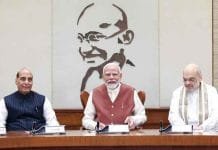25 June Declared as ‘Constitution Murder Day’: Central Government Issues Notification
INVC NEWS
New Delhi : The Central Government has officially declared June 25th as ‘Constitution Murder Day’ to commemorate the imposition of the Emergency in India on June 25, 1975. This notification serves as a somber reminder of the period when democratic norms were suspended, and many citizens endured severe hardships. The Home Minister, Amit Shah, emphasized this decision in a tweet, highlighting the importance of remembering the sacrifices made by those who suffered during the Emergency.
Historical Context of the Emergency
The Emergency, declared by then Prime Minister Indira Gandhi, lasted from June 25, 1975, to March 21, 1977. This 21-month period is one of the darkest chapters in Indian democracy. The Emergency saw the suspension of civil liberties, censorship of the press, and the arrest of political opponents without trial. Millions of Indians faced unprecedented challenges, with many detained and tortured for their opposition to the regime.
Significance of ‘Constitution Murder Day’
The observance of ‘Constitution Murder Day’ aims to keep the spirit of democracy alive and remind future generations of the importance of protecting democratic values. The Central Government’s notification underscores the need to honor the resilience of those who fought against tyranny and struggled to restore democratic principles in the country.
Amit Shah’s Statement
In a poignant tweet, Home Minister Amit Shah stated, “On June 25, 1975, the then Prime Minister Indira Gandhi showcased her dictatorial mindset by imposing the Emergency, strangling the soul of Indian democracy. Millions were unjustly imprisoned, and the voice of the media was suppressed.” He added, “The decision by the government led by Prime Minister Narendra Modi to observe ‘Constitution Murder Day’ annually is a tribute to those who faced innumerable atrocities and persecution by the dictatorial government yet fought tirelessly to revive democracy.”
Impact on Indian Democracy
The imposition of the Emergency had a profound impact on Indian democracy. It was a period marked by widespread human rights violations and a blatant disregard for constitutional norms. The government’s decision to commemorate this day is an effort to ensure that such a period is never repeated in Indian history. It serves as a constant reminder of the fragility of democratic institutions and the need for vigilance to protect them.
Remembering the Victims of the Emergency
The declaration of ‘Constitution Murder Day’ is not just about remembering a dark period in history but also about paying homage to the countless individuals who endured unimaginable suffering. These individuals, through their unwavering commitment, played a crucial role in the restoration of democracy in India. Their sacrifices are a testament to the resilience and spirit of the Indian people.
Educational Initiatives and Public Awareness
To commemorate ‘Constitution Murder Day,’ the government plans to undertake several educational initiatives aimed at raising public awareness about the Emergency. These initiatives will include:
- Documentaries and Films: Production of documentaries and films that detail the events of the Emergency, highlighting personal stories of those affected.
- Educational Programs: Schools and universities will incorporate lessons on the Emergency into their curricula to educate young minds about this significant period in Indian history.
- Public Exhibitions: Exhibitions featuring photographs, documents, and artifacts from the Emergency period will be organized across the country.
The Role of Media During the Emergency
The Emergency period witnessed unprecedented censorship and suppression of the media. Newspapers and magazines were required to obtain government approval before publication, resulting in the stifling of free speech. Journalists who dared to speak against the government faced imprisonment and harassment. The observance of ‘Constitution Murder Day’ will also serve as a reminder of the importance of a free press in a democratic society and the need to protect journalistic freedoms.
The Legal and Political Ramifications
The Emergency period brought significant legal and political changes in India. The 42nd Amendment to the Constitution, passed during the Emergency, curtailed judicial review and concentrated more power in the hands of the executive. The end of the Emergency saw a wave of legal reforms aimed at restoring democratic norms and preventing the recurrence of such an authoritarian regime.
Conclusion: A Day of Reflection and Vigilance
June 25th, observed as ‘Constitution Murder Day,’ will be a day of reflection and vigilance for all Indians. It is a day to honor the memory of those who suffered and fought for the restoration of democracy. It is also a day to remind ourselves of the importance of safeguarding our democratic institutions and ensuring that such a period of authoritarian rule never returns.
By commemorating ‘Constitution Murder Day,’ the Central Government aims to instill a sense of responsibility among citizens to protect and uphold the values enshrined in the Constitution. It is a call to remain vigilant against any threats to democracy and to honor the sacrifices of those who stood up against tyranny.
The observance of this day is a testament to India’s commitment to democracy, freedom, and justice. It is a reminder that the fight for democracy is ongoing and that each generation must play its part in preserving the democratic fabric of the nation.













